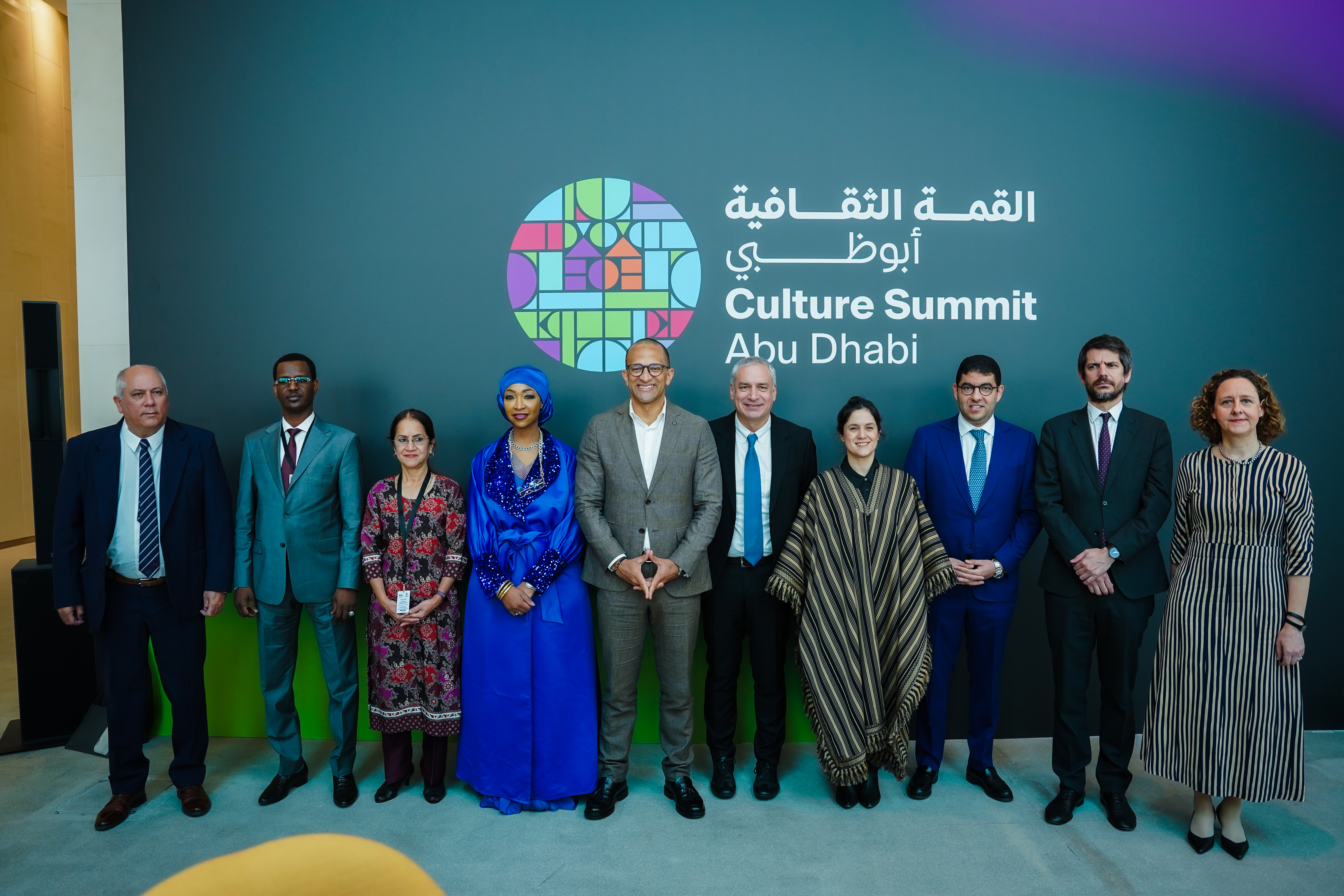Culture ministers from around the world call for collective action to make culture a Sustainable Dev

MONDIACULT Ministerial Dialogue participants, from left: H.E. Alpidio Alonso (Republic of Cuba), H.E. Abakar Rozzi Teguil (Republic of Chad), H.E. Marie Anne Janick Jaunbocus (Republic of Mauritius), H.E. Hannatu Musa Musawa (Federal Republic of Nigeria), H.E. Abraão Vicente (Republic of Cabo Verde), Ernesto Ottone Ramirez, Assistant Director-General for Culture, UNESCO, H.E. Adriana Ortiz (Republic of Paraguay), H.E. Mohamed Mehdi Bensaid (Kingdom of Morocco), H.E. Ernest Urtasun (Kingdom of Spain), HE Nina Obuljen Koržinek, (Croatia); Culture Summit Abu Dhabi 2024. Courtesy DCT Abu Dhabi.
ABU DHABI, United Arab Emirates, March 04, 2024 (GLOBE NEWSWIRE) -- Culture ministers from Spain, Morocco, Nigeria, Paraguay, Mauritius, Cabo Verde, Croatia, Cuba and Chad gathered today at the Culture Summit Abu Dhabi to inaugurate the first MONDIACULT Ministerial Dialogue, urging civil societies to take collaborative action and join the growing chorus of voices campaigning for culture to be recognised as a Sustainable Development Goal (SDG).
The dialogue, organised by the Department of Culture and Tourism – Abu Dhabi (DCT Abu Dhabi) and UNESCO, builds on the historic Declaration for Culture which was unanimously adopted by 150 states at the 2022 MONDIACULT summit. A turning point for international cooperation on cultural policy, stakeholders are now building on the momentum generated ahead of the next MONDIACULT forum for ministers of culture in Barcelona in 2025.
“Culture is going to be a major driving force of international cooperation in the next few years,” said H.E. Ernest Urtasun, Minister of Culture, Kingdom of Spain. “In a world of fragmentation, we need culture more than ever. We ask all people engaging in cultural sectors to work with us to make it a successful exercise.”
Though global creative economies are valued at 2 trillion dollars and boast 50 million jobs worldwide, they remain largely untapped. Ministers agreed on the importance of culture having a seat at the table in light of challenges faced by countries worldwide today. H.E. Alpidio Alonso, Minister of Culture, Republic of Cuba, said: “There is a lack of commitment in some countries with regards to culture. It is important to acknowledge it so we can share values - how can we generate better spaces for intercultural dialogue? Without culture we lose our future.”
This opening session set the tone for the day, which focused on ‘A Time to Act’, a theme that looks at how various cultural stakeholders are seizing the day to put culture front and centre as a tool for leadership, dialogue, and the betterment of societies - particularly during times of conflict. HE Nina Obuljen Koržinek, Minister of Culture and Media, Government of Croatia said: “We live in a prolonged period of crisis; the climate crisis is here to stay, and digital challenges are not getting an answer immediately. How do we overcome our inability to understand that it is only if we act together then we can achieve something? Culture in its full potential can be a catalyst for finding solutions and bringing people to work together.”
In his keynote address, H.E. Sheikh Salem bin Khalid Al Qassimi, UAE Minister of Culture also underscored the challenges gripping the world, and the role of culture in addressing them. He announced the results of the UNESCO World Conference on Culture and Arts Education held in Abu Dhabi last month, which led to the unanimous adoption of a new framework to prioritise culture and arts education in teacher training, and to push local and indigenous culture in the classroom. The UAE Minister of Culture also encouraged an alignment with ‘new cultural time’, noting that while artificial intelligence is now part of our daily lives, “digital transformation in culture must serve to bridge gaps, not widen them.”
Remarking on the UAE and the wider region’s emphasis on the importance of culture, Department of Culture & Tourism - Abu Dhabi (DCT Abu Dhabi) Chairman H.E. Mohamed Khalifa Al Mubarak said: “Here in the Arabian Peninsula, the investment in culture has been immense. From the UAE, to the wider GCC region – there is an emphasis on preserving culture while simultaneously sharing it with the world. This is something we are setting our minds to in Abu Dhabi, and there is a paradigm shift in the understanding and the importance of culture in this region. While many parts of the world are decreasing overall spend in arts and culture, this region - in particular the UAE – is significantly increasing its investment.”
Elsewhere, museum directors convened about the need to identify with the culture of the times in the panel ‘Building Forever? The New Art of Sharing’. Kaywin Feldman, director of the National Gallery of Art Washington, Manuel Rabaté, director of Louvre Abu Dhabi and Mariët Westermann, Vice Chancellor of NYU Abu Dhabi and Director and CEO Elect, Solomon R. Guggenheim Museum and Foundation discussed possible alternatives to the museum’s traditional permanent collection model. Westermann said: “At an important global crossroads, it is necessary to consider what a museum can mean at a moment that is hopefully truly postcolonial. The Guggenheim has a great opportunity to change us so we become truly international.
On her part, Feldman noted: “We must start to stop measuring growth in 21st century paradigms. The idea that we have to own everything is a 20th century mentality - I am excited about embracing a new mindset of sharing our assets.”
The sixth edition of the Summit will run until 5 March at Manarat Al Saadiyat in Abu Dhabi.
For more information on Culture Summit Abu Dhabi, its full programme, and sessions available to watch online, please visit www.culturesummitabudhabi.com.
Culture Summit Abu Dhabi Press Kit, including imagery, is available here.
PRESS ENQUIRIES:
Anastasia Lander, Pelham Communications
anastasia@pelhamcommunications.com
About the Department of Culture and Tourism – Abu Dhabi
The Department of Culture and Tourism – Abu Dhabi (DCT Abu Dhabi) drives the sustainable growth of Abu Dhabi’s culture and tourism sectors, fuels economic progress and helps achieve Abu Dhabi’s wider global ambitions. By working in partnership with the organisations that define the emirate’s position as a leading international destination, DCT Abu Dhabi strives to unite the ecosystem around a shared vision of the emirate’s potential, coordinate effort and investment, deliver innovative solutions, and use the best tools, policies, and systems to support the culture, creative and tourism industries.
DCT Abu Dhabi’s vision is defined by the emirate’s people, heritage, and landscape. We work to enhance Abu Dhabi’s status as a place of authenticity, innovation, and unparalleled experiences, represented by its living traditions of hospitality, pioneering initiatives and creative thought.
About UNESCO
With 194 Member States, the United Nations Educational, Scientific and Cultural Organization contributes to peace and security by leading multilateral cooperation on education, science, culture, communication and information. Headquartered in Paris, UNESCO has offices in 54 countries and employs over 2300 people. UNESCO oversees more than 2000 World Heritage sites, Biosphere Reserves and Global Geoparks; networks of Creative, Learning, Inclusive and Sustainable Cities; and over 13 000 associated schools, university chairs, training and research institutions. Its Director General is Audrey Azoulay.
A photo accompanying this announcement is available at https://www.globenewswire.com/NewsRoom/AttachmentNg/e6188320-f791-427b-9e1a-8d8fd50d6d8f
文章来源用户投稿,转载请注明出处:/hangye/3442.html

